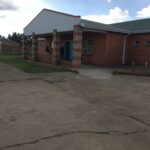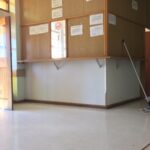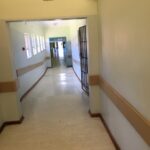31st January 2018
In an effort to understand the mental health system in Lesotho a bit better I started my day by visiting the psychiatric hospital in Maseru. Mohlomi Hospital is situated to the South of the city in rural countryside and next to a large army barracks. Me Lehema, the Director of Mental Health was visiting that day too to provide supervision to the staff.

On arrival I was greeted by several members of staff who enquired about my business and showed where to wait for the Director’s arrival. While waiting a psychologist who I had had some correspondence with walked past and recognised me (I do stand out a bit). She invited me to her office and we had a conversation about the challenges of delivering psychological services in Lesotho.
As I have mentioned in a previous blog, Mohlomi is the only psychiatric hospital in Lesotho. One of the first issues is that there are no psychiatrists working in the hospital. Pulane explained that there are quite a few trained Basotho psychiatrists but due to the better pay and conditions elsewhere they leave. The last psychiatrist to work in Mohlomi left over a year ago. They do have general practitioners working in the hospital but they tend to come from abroad and don’t speak the Sesotho language so the initial history is often taken by a nurse who does speak the language.
There are 4 psychologists at Mohlomi but only two of them are fully trained. Pulane’s Master’s degree is actually in public health and this is clear from the population wide perspective she has on service development. As she described her working week to me there were some really interesting aspects of the way they work which could improve the way we do things in Wales but it was also clear that a major driver in the way they work was the lack of resources.
Monday for the psychologists is new referral day. They will see anyone who turns up. Appointments are not made as transport issues make attending at a certain time difficult. This means they have no waiting lists but also they have no idea who is going to walk through the door. Much of the work is brief solution focused work as there is no guarantee that people will be able to attend a second session. The most common presenting problems are depression (particularly among women) and substance misuse and psychosis (where men are over represented).
Tuesday and Thursday are allocated for working on the wards but one Wednesday and Friday the doctors hold follow-up clinics which provide an opportunity for the psychologists to see people returning for a repeat of their medication. If the incentive of a repeat prescription is not there it is apparently difficult to persuade people to return just for therapy.



After a good discussion with Pulane, the Director arranged for me to have a tour of the facility. Again the issue of the lack of resources was discussed as was the fact that the staff are aging and those that leave or die are not being replaced quickly.
The first stop was outpatients where the wooden benches reminded me strangely of the train station in Brief Encounter. After that we went to the men’s ward. Most of the patients were locked outside in the exercise yard except for a few that were locked in assessment rooms because they were deemed to be a danger to themselves, other patients or staff. They did not appear to be happy with their lot.



The older adults unit came next and there was a serious lack of comfort. Apparently, it is common for patients to rip their bed linen resulting in shortages. On occasion, there is also a lack of beds resulting in people being accommodated on mattresses on the floor. Outside there were people sleeping on the walkways but I was told this was their choice.


The female ward did actually have people walking around, one of whom stopped me and asked for my help to get out of there as she was physically ill not mentally ill. She was led away by staff. As the forensic unit is run by staff from the correctional services I was unable to visit there but I was shown the occupational therapy building which was largely unused as there was no OT.
I finished my tour and spoke once again with the Director. We have agreed to meet tomorrow to discuss how we can help support the service improvements and the roll-out of mhGap.






























